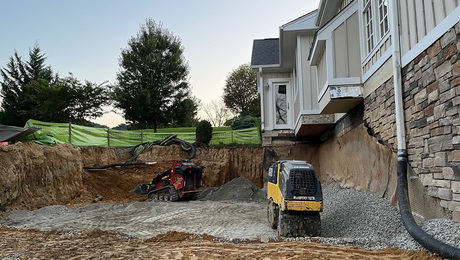Can anyone advise me at what humidity level I should set my dehumidifier. Its a new home and it is in the basement. I first set it @45 and the damned thing never shut off. Now I have it @55 and it still runs a lot. Im mostly interested in preventing damage to items from mould, etc.I imagine coating the walls with some type of water resistant paint would also help. Thanks.
Discussion Forum
Discussion Forum
Up Next
Video Shorts
Featured Story

Listeners write in about ambitious projects and sinking patios before asking questions about old house specialists, attic headroom, and home shops.
Highlights
"I have learned so much thanks to the searchable articles on the FHB website. I can confidently say that I expect to be a life-long subscriber." - M.K.

















Replies
Mike,
The American Society of Heating, Refrigerating and Air-Conditioning Engineers (ASHRAE) recommends that humidity levels for comfort and health be maintained between 30% relative humidity (rh) and 60% rh.
The most common and practical way to dehumidify moist air is to decrease the temperaure beyond the dewpoint. 75 degree air at 60% rh has a dew point of about 60 degrees, at 50% rh the dewpoint is about 55 degrees. This also approximately the "deep earth" temperature of half of the continental US. Makes dehumidifying a basement, without "reheat" a difficult task.
If your dehumidifier is a point/portable type, it will only effectively serve a very small area, say 100 - 200 square feet, depending on other factors. One of those factors is air movement. The little fan in these things doesn't move much air, which is why they can only cover a limited area. You can help it by using a portable fan to circulate more of the air in the space to/from the device. If you have forced air in the space, run the furnace fan.
Another factor is the moisture load. How much moisture is being added and from what source(s). Aside from dehumifying the air, try to mitigate the load as much as possible. Moisture coming through the foundation and slab from the ground is hard to mitigate in a finished structure. Good contruction practices can almost eliminate most sources of ground moisture. Internal sources, like showers, unvented dryers, cooking, etc., can be somewhat controlled, mostly by good venting practices. Most people don't cook in their basements, buth bathroom and dryers are common. Make sure these things are vented/exhausted well.
You said the house is new. New houses are usually "wet". If it was just built this summer, all of the lumber will have a lot of moisture to release, and I think the concrete fully cures in something like 6 months (?). It will get better in time. Winter and a forced air AC system will help a lot. I would give it time (a year) to dry out before trying to seal out the water, because it is probably already in the house.
Tim covered all the important points. Good post.
David Thomas Overlooking Cook Inlet in Kenai, Alaska
Thank you.
Tim,
Thanks for a very thorough and easily understandable explaination. The house took me me two years to build and we just got in this last July. As you suggested, I am going to wait out the winter and see what happens. No wonder the dehumidifier doesnt do a good job. I have 2175 sq ft,8ft high down there.